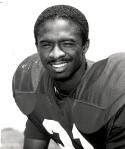
Bobby Butler
Stars of Yesterday: Bobby Butler, The First Great Cornerback
By Jim Joanos
Florida State football teams through the years have included a number of very outstanding cornerbacks. Cornerbacks are those defensive players who have the primary responsibility for limiting the productivity of the opposing team’s wide receivers. Of all the positions on the team, cornerback is possibly the most difficult to play. In order to “cover” speedy wide receivers, a cornerback must be fast, shifty, and very athletic. In addition, he must be tough enough to tackle not only the wide receivers after they catch passes but to do double duty as the last line of defense against running backs who break through the team’s first line of defense. They generally are also required to fulfill other duties such as blitzing the quarterback, running back punts, or attempting to block punts and attempted field goals and extra points. FSU has been fortunate through the years to have had some excellent cornerbacks. A few of the great FSU cornerbacks that come quickly to mind include Deion Sanders, Terrell Buckley, Leroy Butler, and very recently, Xavier Rhodes.
There have always been defensive backs in college football. However, as the strategy of the game developed through the years, and some of the defensive backs began to be positioned closer to the front corners of the defense and their duties became more defined, sometime during the nineteen seventies some of them became labeled in a more descriptive fashion as “cornerbacks.”
 |
Bobby Butler |
Bobby Bowden became FSU’s head football coach in 1976. It was pretty late for him to have much effect on the class of freshmen for that first season. However, for the 1977 season, he was able to bring in a very good group of freshmen. Among the members of that class was Robert Calvin “Bobby” Butler. That class also included Ron Simmons, Bill Capeece, Reggie Herring, Homes Johnson, Keith Jones, Ken Lanier, Paul Piurowski, Sam Platt, and others who along with Butler would spearhead FSU’s drive to the top of college football. Their tenure at FSU, led the team to national attention as well as its first two appearances ever in the heralded Orange Bowl games. From that class, Ron Simmons became FSU’s first great nose tackle while Bobby Butler became its first great cornerback.
Butler was born in Boynton Beach, Florida, in 1959 and was an outstanding athlete in high school at Atlantic High School in Delray Beach, Florida. He helped lead his high school football team to conference, district and regional championships and twice (1975 and 76) to acclaim as state runners-up. He was recognized as the 1976 Orlando Sun-Sentinel Player of the Year.
At FSU, Butler was a consistent starter for all four seasons that he was on campus. In his first game, a 35-6 victory for FSU at Southern Mississippi, he picked up a nickname, “Sweets,” in regard to a hit that he took during the game, that he would retain throughout his college career. Throughout his college career he terrorized the other teams’ pass receivers. His assignment for each game was usually to work man on man against the opponent’s best wide out. He regularly limited those unfortunate folks to very little production. He also had a knack for blocking kicks. On punts and extra points, he would line up at an end position and “blitz” the kickers. During his FSU time, he set new records as he blocked seven kicks. One of them against mighty Oklahoma in FSU’s first trip to the Orange Bowl game. During Butler’s stay at FSU, the team won 39 games and lost only eight. In all four seasons, the Seminoles defeated their chief rival, the University of Florida.
Butler’s productivity on the field was recognized nationally by the Associated Press by his being named an Honorable Mention All-American in 1979, and Third-Team All-American in 1980. He was also named First-Team All-American by the Newspaper Enterprises Association.
Butler was a two-sport All-American at FSU. In addition to football, he was also so recognized in Track and Field. As a sprinter, he was a valuable member of the track team. His accomplishments in that sport included his running the first leg of the four by one hundred meter relay team which finished third in the national NCAA track meet.
At the end of his college career, Butler’s superb abilities as a cover corner back was recognized when the Atlanta Falcons chose him in the first round of the 1981 draft. He played well for the Falcons for twelve seasons, a full and very successful football career. After retirement from football, he has continued his success in several endeavors. Two of his four sons have become professional athletes, one playing basketball in Europe and another as a wide receiver with the Oakland Raiders.
In today’s college football world, FSU has a reputation as one of the elite programs. It is athletes like Bobby Butler who have played a large role in that success. Those of us who had the privilege of watching him play are grateful for that experience.